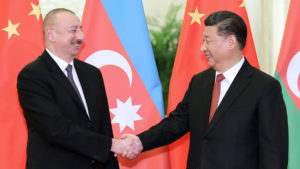By Seymur Mammadov

The Belt and Road Initiative (BRI) is one of the most important milestones in the development of the world economy. Today we see how the interest in this initiative is growing rapidly, and not only from the countries through which the ancient Silk Road passed, but also from countries that were in no way historically associated with the Chinese initiative.
Therefore, it is not by chance that the second Belt and Road Forum for International Cooperation (BRF) became much larger and more substantial than the first one. What conclusions can be drawn from this forum? How will the forum affect the Azerbaijan-China relations in the near future?
The first conclusion I would draw from this forum is China’s continuation of the course of foreign openness. China has always given priority to the implementation of multilateral and bilateral economic and trade agreements.
In the next two years, thanks to the openness policy, China will continue to involve a number of countries, in particular, European countries, in the BRI framework. China-Italy memorandum of understanding on BRI can serve as a precedent for other European countries.
The second conclusion is China’s interest in increasing imports of goods and services, as well as in balanced trade. China still has the world’s largest population, and in order to satisfy the constant consumer demand, it is necessary to further open its domestic market for foreign countries.
To accomplish this task, it is necessary to reduce the level of customs duties, eliminating various non-tariff barriers. Such a trade policy will allow China to balance its trade with other countries. The second China International Import Expo will be held in Shanghai this November, which will create a platform for foreign companies to enter the Chinese market.
Against the backdrop of rising protectionist, de-globalization and unilateralist sentiments, China has proposed a formula of inclusive development and economic integration in the interests of all countries, which in the future will improve their financial and economic conditions.
The third conclusion is that Beijing, possibly, will try to make additional efforts to eliminate the growing suspicions of the “debt trap” and the BRI’s so-called challenges to the current Western-centric trading systems.
Western countries are most worried about China’s dynamic economic growth, which has actually become the engine of the global economy. Thanks to the BRI, China was able to unite many countries under a single slogan.
And here is the result. In recent years, the volume of China’s trade with BRI countries amounted to more than 6 trillion U.S. dollars; foreign direct investment exceeded 80 billion U.S. dollars; 82 cooperation parks were built, creating about 300,000 jobs for host countries.
It is not surprising that many countries support the BRI, as they take real advantages from cooperating with China. Azerbaijan is a typical example. It is not by chance that President Ilham Aliyev of Azerbaijan became an important guest to the BRF and the companies of Azerbaijan and China signed a number of contracts totaling more than 480 million U.S. dollars.
That opens a new milestone in the China-Azerbaijan relations. Azerbaijan is at the crossroads of the routes stretching from Russia to India and from China to Europe. Today, Azerbaijan has created a modern transport and logistics infrastructure, and all the necessary conditions have been created for the transportation of goods from China to Europe.
For example, the Absheron logistics center and the Baku International Sea Trade Port complex in the Alat settlement were built; the Baku-Tbilisi-Kars railway was put into operation, which connects not only Turkey, Georgia, and Azerbaijan, but also connects China and Central Asian countries with Europe.
The advantage of this railway is a significant reduction in the timing of deliveries of goods from China to Europe through the territory of Azerbaijan. As we can see, Azerbaijan is becoming an increasingly important node on the new Silk Road.
Regarding investment, up to 120 companies with Chinese capital have already been registered in Azerbaijan. Azerbaijan has invested 1.7 billion U.S. dollars in China, and China has invested more than 800 million U.S. dollars in Azerbaijan.
In the next few years, China and Azerbaijan may even witness the signing of an agreement on trade facilitation for certain types of goods. For example, the Azerbaijani side is interested in supplying its agricultural products to China on more favorable terms.
Azerbaijan-China relations can reach a higher level if the parties sign a free trade agreement, with the condition that it will be mutually beneficial and ensure balanced trade.
Given the above, Aliyev and Chinese President Xi Jinping have opened a new chapter in China-Azerbaijan bilateral relations. Signed contracts worth more than 480 million U.S. dollars are clear evidence of that. In the coming years, we will see rapid growth in China-Azerbaijan bilateral trade.
Editor’s Note: The author is the director of the international expert club EurAsiaAz and editor-in-chief of the Azerbaijan’s news agency Vzglyad.az. The article reflects the author’s opinion and not necessarily the views of CGTN.
Disclaimer:
The views and opinions expressed in this article/Opinion/Comment are those of the author and do not necessarily reflect the official policy or position of the Dispatch News Desk (DND). Assumptions made within the analysis are not reflective of the position of Dispatch News Desk.
Note: The DND has reproduced the above article, already published by CGTN.
